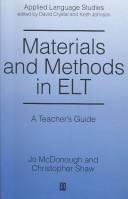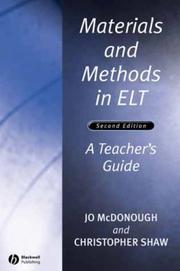| Listing 1 - 10 of 29 | << page >> |
Sort by
|
Book
ISBN: 0429463480 0429872763 1138615048 Year: 2023 Publisher: Routledge
Abstract | Keywords | Export | Availability | Bookmark
 Loading...
Loading...Choose an application
- Reference Manager
- EndNote
- RefWorks (Direct export to RefWorks)
Book
Year: 1953 Publisher: London Novello
Abstract | Keywords | Export | Availability | Bookmark
 Loading...
Loading...Choose an application
- Reference Manager
- EndNote
- RefWorks (Direct export to RefWorks)
Engeland --- 20e eeuw --- Kamermuziek --- Sonates
Book
ISBN: 0821321102 Year: 1992 Publisher: Washington, D.C. World Bank
Abstract | Keywords | Export | Availability | Bookmark
 Loading...
Loading...Choose an application
- Reference Manager
- EndNote
- RefWorks (Direct export to RefWorks)

ISBN: 0631180036 Year: 1993 Volume: *1 Publisher: Oxford ; Cambridge Blackwell
Abstract | Keywords | Export | Availability | Bookmark
 Loading...
Loading...Choose an application
- Reference Manager
- EndNote
- RefWorks (Direct export to RefWorks)
Didactics of English --- Engelse taal --- didactiek --- didactiek. --- English language --- Study and teaching --- Foreign speakers --- Germanic languages --- Study and teaching&delete& --- EFL (Language study) --- English as a foreign language --- English as a second language --- English to speakers of other languages --- ESL (Language study) --- ESOL (Language study) --- Teaching English as a second language --- TEFL (Language study) --- TESL (Language study) --- Foreign students

ISBN: 0631227377 0631227369 9780631227373 Year: 2003 Publisher: Malden, MA: Blackwell,
Abstract | Keywords | Export | Availability | Bookmark
 Loading...
Loading...Choose an application
- Reference Manager
- EndNote
- RefWorks (Direct export to RefWorks)
English language --- Study and teaching --- Foreign speakers. --- 802.0-07 --- Engels: taalonderwijs; taalverwerving --- 802.0-07 Engels: taalonderwijs; taalverwerving --- Germanic languages --- Study and teaching&delete& --- Foreign speakers --- EFL (Language study) --- English as a foreign language --- English as a second language --- English to speakers of other languages --- ESL (Language study) --- ESOL (Language study) --- Teaching English as a second language --- TEFL (Language study) --- TESL (Language study) --- Foreign students --- English language - Study and teaching - Foreign speakers.
Book
ISBN: 1280486465 9786613581440 1443838497 9781443838498 1443837482 9781443837484 Year: 2012 Publisher: Newcastle upon Tyne Cambridge Scholars Publishing
Abstract | Keywords | Export | Availability | Bookmark
 Loading...
Loading...Choose an application
- Reference Manager
- EndNote
- RefWorks (Direct export to RefWorks)
On Exceeding Determination and the Ideal of Reason: Immanuel Kant, William Desmond, and the Noumenological Principle examines the critical philosophy of Immanuel Kant, as it bears on theological principles. Focusing on the foundational ideas (of self, wor
Metaphysics. --- Philosophy --- God --- Ontology --- Philosophy of mind --- Kant, Immanuel, --- Kant, Immanuel --- Kant, I. --- Kānt, ʻAmmānūʼīl, --- Kant, Immanouel, --- Kant, Immanuil, --- Kʻantʻŭ, --- Kant, --- Kant, Emmanuel, --- Ḳanṭ, ʻImanuʼel, --- Kant, E., --- Kant, Emanuel, --- Cantơ, I., --- Kant, Emanuele, --- Kant, Im. --- קאנט --- קאנט, א. --- קאנט, עמנואל --- קאנט, עמנואל, --- קאנט, ע. --- קנט --- קנט, עמנואל --- קנט, עמנואל, --- كانت ، ايمانوئل --- كنت، إمانويل، --- カントイマニユエル, --- Kangde, --- 康德, --- Kanṭ, Īmānwīl, --- كانط، إيمانويل --- Kant, Manuel, --- Criticism and interpretation. --- Metaphysics --- 1 KANT, IMMANUEL --- 215.1 --- 215.1 Verhouding godsdienst en filosofie --- Verhouding godsdienst en filosofie --- 1 KANT, IMMANUEL Filosofie. Psychologie--KANT, IMMANUEL --- Filosofie. Psychologie--KANT, IMMANUEL
Book
ISBN: 9780226636474 Year: 2019 Publisher: Chicago University of Chicago Press
Abstract | Keywords | Export | Availability | Bookmark
 Loading...
Loading...Choose an application
- Reference Manager
- EndNote
- RefWorks (Direct export to RefWorks)
Book
ISBN: 9780865715929 Year: 2008 Publisher: Gabriola Island New Society Publishers
Abstract | Keywords | Export | Availability | Bookmark
 Loading...
Loading...Choose an application
- Reference Manager
- EndNote
- RefWorks (Direct export to RefWorks)
Book
ISBN: 9783034319881 3034319886 9781787078895 9781787078888 9781787078901 Year: 2018 Publisher: Bern Peter Lang
Abstract | Keywords | Export | Availability | Bookmark
 Loading...
Loading...Choose an application
- Reference Manager
- EndNote
- RefWorks (Direct export to RefWorks)
This new study offers a serious and long-overdue examination of the unstable bifurcation between theology and secularity. Rather than understanding these two formative elements of culture to be in a constant state of opposition, the author chooses an alternative path toward their reconciliation. In this way, a constructive relationship is developed between secular and theological ideas wherein they symbiotically challenge one another in such a way as to create new and/or re-examined opportunities for thinking about God, the world, and, indeed, the self.0The book first of all embarks upon a hermeneutical reading of Meister Eckhart?s defining statement that 'Being is God' and ultimately arrives (via Kant, Hegel, Gadamer, Henry, and others) at a mystically informed understanding of God?s presence both in the world and in the 'heart and mind' of the human experience ? an understanding that defies conventional categories and static cultural identities. It is an important study of the history, the present, and the future of religious thought, presenting a hopeful image of unity and love in a world that has been for too long divided by difference.
Book
ISBN: 022663647X Year: 2019 Publisher: Chicago, Illinois ; London : The University of Chicago Press,
Abstract | Keywords | Export | Availability | Bookmark
 Loading...
Loading...Choose an application
- Reference Manager
- EndNote
- RefWorks (Direct export to RefWorks)
Banks and bankers are hardly the most beloved institutions and people in this country. With its corruptive influence on politics and stranglehold on the American economy, Wall Street is held in high regard by few outside the financial sector. But the pitchforks raised against this behemoth are largely rhetorical: we rarely see riots in the streets or public demands for an equitable and democratic banking system that result in serious national changes. Yet the situation was vastly different a century ago, as Christopher W. Shaw shows. This book upends the conventional thinking that financial policy in the early twentieth century was set primarily by the needs and demands of bankers. Shaw shows that banking and politics were directly shaped by the literal and symbolic investments of the grassroots. This engagement remade financial institutions and the national economy, through populist pressure and the establishment of federal regulatory programs and agencies like the Farm Credit System and the Federal Deposit Insurance Corporation. Shaw reveals the surprising groundswell behind seemingly arcane legislation, as well as the power of the people to demand serious political repercussions for the banks that caused the Great Depression. One result of this sustained interest and pressure was legislation and regulation that brought on a long period of relative financial stability, with a reduced frequency of economic booms and busts. Ironically, this stability led to the decline of the very banking politics that brought it about. Giving voice to a broad swath of American figures, including workers, farmers, politicians, and bankers alike, Money, Power, and the People recasts our understanding of what might be possible in balancing the needs of the people with those of their financial institutions.
Banks and banking --- Social aspects --- Citizen participation. --- Government policy --- History --- Farm Credit System. --- Federal Deposit Insurance Corporation. --- Federal Reserve System. --- bankers. --- banking. --- democracy. --- farmers. --- money. --- postal savings. --- workers.
| Listing 1 - 10 of 29 | << page >> |
Sort by
|

 Search
Search Feedback
Feedback About UniCat
About UniCat  Help
Help News
News